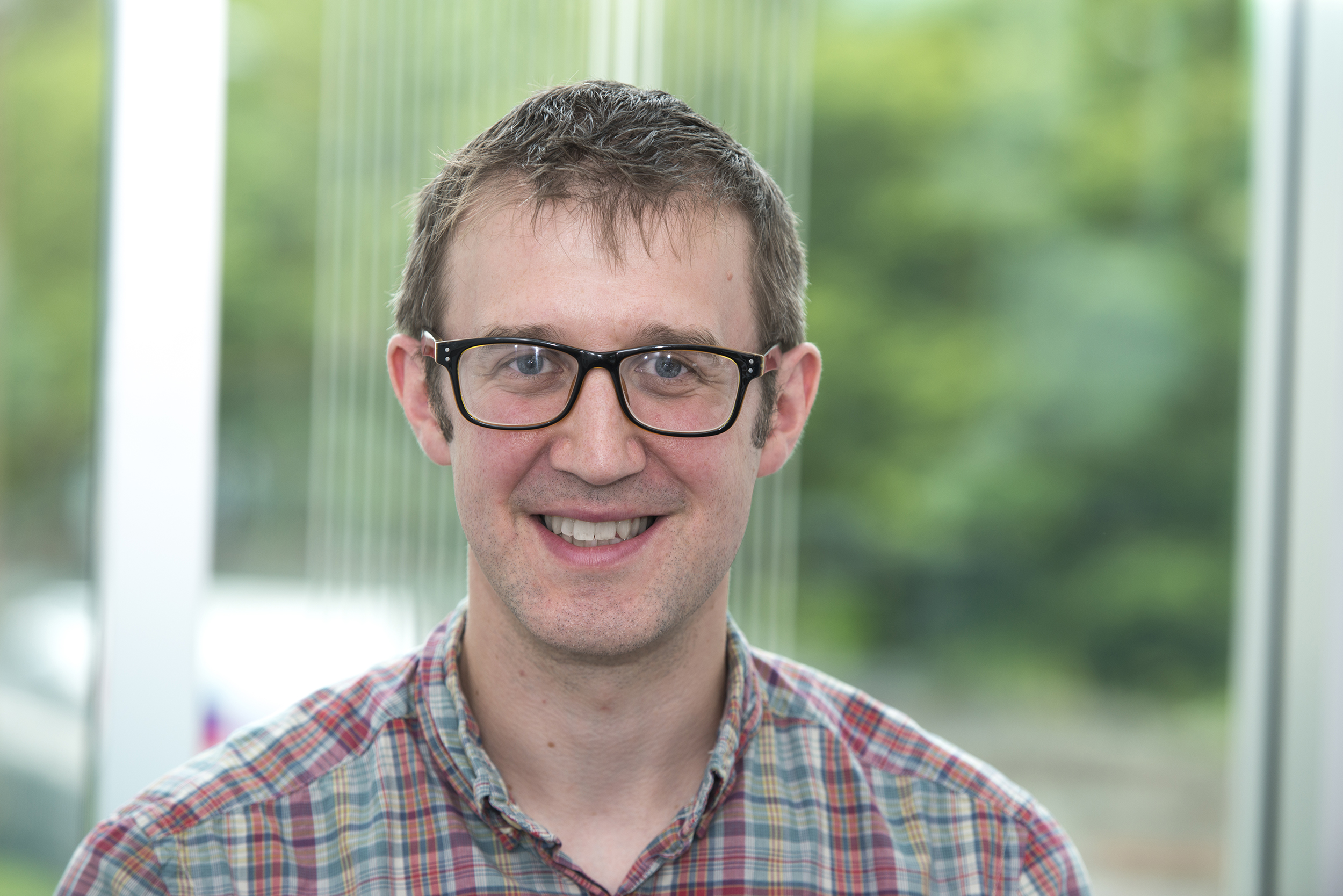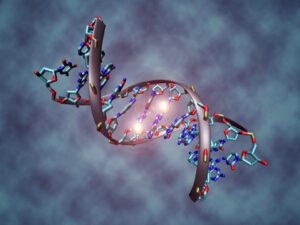Choosing the middle path between wet-lab and computational biology: a chat with Dr Duncan Sproul

Dr Duncan Sproul is a CRUK Career Development Fellow at the MRC Human Genetics Unit and Institute of Genetics and Cancer at the University of Edinburgh. His work focusses on understanding the molecular mechanisms behind deregulated DNA methylation in disease. I met with him to chat about his career, his thoughts on how epigenetics will advance in the coming years and his advice for navigating the world of biology in an increasingly computational field.
I started by asking Duncan what his path into science and into the field of epigenetics was. “Going back to school, I felt like I always wanted to do science and I was interested in biology probably because of David Attenborough programmes. I originally wanted to be a computer programmer though and nearly did physics, but I applied for biology as well. Then while visiting Edinburgh, the person showing me round physics put me off, so I did a genetics degree in Edinburgh instead.” Regarding entering the field of epigenetics, Duncan says: “In my degree I’d heard a little bit about epigenetics and while looking for a PhD, I heard a talk by Wendy Bickmore (Director of the MRC Human Genetics Unit) and thought, that’s cool. So, I came here [Institute of Genetics and Cancer] to do my PhD and ended up working in her lab after rotations.”
Interested by his initial enthusiasm for programming and Physics, I ask whether Duncan would have wanted to mix more of these into his biology studies. “I tried. When I did my degree, I tried to do a joint physics and biology degree… and asked whether I could take some first year physics courses, but they couldn’t make it work on the timetable, so I couldn’t do it…I think in retrospect, I’ve never worked fully in physics, but coming into biology at a time when it was transitioning to be more computational and more numerical, has just been a really lucky position for my career.” Duncan goes on to explain how he’s kept his interest in physics and programming as part of his research. “My PhD was in the lab, but I also did all my own data analysis, and now we’re putting out a mathematical paper with Dr Lyndsay Kerr who’s a mathematician and her second supervisor is a physicist.”
Curious to know where his research began and how it led him to where he is now, I asked Duncan what he researched during his PhD. “My PhD was on the role of chromatin in regulating epidermal differentiation complex. It’s a very large cluster of genes on chromosome one and all the genes are involved in the differentiation of skin. When your skin cells differentiate, they nucleate and become flat structures, with a load of specialized proteins and lipids that help exclude water and pathogens. So, the idea was to do some epigenomics [on this region] using techniques like ChIP onto microarrays, sucrose gradients and FISH.
Duncan comments on the fact that he learnt a wide range of different skills in his PhD “everything from sucrose gradients to quite hardcore biochemistry to quite hardcore data analysis.” This gave him an open-minded attitude to solving both wet-lab and data analysis problems. As a wet-lab scientist myself, entering an increasingly computational field at the start of my PhD, I asked how he went about picking up the computational aspect of his PhD.
“There was no one doing ChIP-seq or ChIP on arrays, and so I just had to read and work out how to do it. I’d had enough time playing around with computers as a teenager teaching myself to program very easy stuff, that it didn’t scare me to try it. So, I just taught myself, asked a few people, and read articles.” Duncan stresses that a PhD is a great time to pick up new skills. “You have a lot of time, and it’s a lot more focused than later stages in your career.” His advice for picking up computational skills is to apply them practically to answer your research question. “There needs to be some objective, because it becomes a lot more focused if you break it down into a little problem and say, I need to solve how to do this. The way we should be doing science is saying, here’s the question I want to answer and I’m going to get there by whatever means. That sometimes involves going out and learning something new or realizing I need to work with this person to do that particular experiment or analysis.”

Credit: Christoph Bock, Max Planck Institute for Informatics
When asked about the advantages of learning computational analysis yourself or working with a bioinformatician he says: “Whether you’re purely computational or purely wet lab, it’s very good to have at least some understanding of both. If you’re a hardcore computational person, you can’t do that in isolation without understanding the experiments to some level. You need to recognize what the data is and where artifacts might arise. If you’re a lab-focused person, being able to understand analysis to some level is vital…You need some insight into how your experiment might be analyzed, so you can design the experiment properly. A specialist computational person can’t necessarily give you that advice. If you go down both paths, you’re never going to be a specialist of both. I probably couldn’t do very complex organoid differentiation, and I can’t do mathematical modelling, but I can understand enough of both to work in the area with people who are specialists.”
He emphasises you can make a career through any path, starting as computational, starting as a wet-lab scientist, or starting somewhere in the middle, it’s just about consciously picking what path you want to go down.
“We know that the pattern of epigenetic marks in the genome is altered in many diseases…But the big question is do they matter?”- Dr Duncan Sproul, Institute of Genetics and Cancer
Having gained insight into his early career I moved on to ask about Duncan’s current research. “We are researching the role of epigenetics in human disease. We know that the pattern of epigenetic marks in the genome is altered in many diseases, particularly in cancer and in aging. But the big question is do they matter? The problem is we don’t understand the mechanisms. As the changes are complex, we can’t recapitulate them, therefore we don’t know if they matter. We hope by understanding the molecular mechanisms we’ll be able to say whether these changes make a difference or not.”
The way Duncan’s group goes about untangling these mechanisms is using genetics. “We’re an epigenetics lab, but we’re using genetics. For example, by finding mutations that occur in rare mendelian conditions, we can compare what happens in those conditions with changes we see in disease. We published a paper with Andrew Jackson’s lab showing that a mutation in the DNA methyltransferase, DNMT3A, leads to microcephalic dwarfism. The changes in DNA methylation you see in these people are very close to one of the types of changes you see in cancer. So, although we don’t see that mutation in most cancers, whatever that mutation is doing, which is changing the binding to chromatin, could be involved in the mechanism occurring in cancer as well.”
Duncan’s group focuses on applying a quantitative understanding to their research. “A lot of the technologies used like ChIP-seq etc., are actually not quantitative at all. They don’t give a mechanistic understanding of what’s going on in chromatin…In a population of cells, you can’t say how many nucleosomes there are with a particular modification, for example, and I think we’re some way away from having a technique that will do that.”
However, one quantitative technique Duncan’s group is starting to employ is microscopy, to understand how DNA methyl transferases interact with chromatin and move around cells. This is because there’s been very little research into how DNMTs behave in cells in vivo. “With DNMT3B, we’ve got an idea that it is being pulled towards euchromatin and heterochromatin and we have a mutation that appears to change that balance, so it’s potentially no longer binding to euchromatin. By using microscopy, we can look at how its movement in the cell changes.”
To conclude, Duncan states that he believes moving beyond very descriptive models to be able to quantify what’s going on, is where he sees us understanding better how the epigenome is regulated. This kind of research will hopefully give rise to a more concrete understanding of how and why DNA methylation is deregulated in disease, as well as its significance in disease.
You can read the paper on DNMT3A here: ‘Gain of function DNMT3A mutations cause microcephalic dwarfism and hypermethylation of polycomb-regulated regions’ https://doi.org/10.1038/s41588-018-0274-x
Find out more about Dr Duncan Sproul’s research group here:https://www.ed.ac.uk/mrc-human-genetics-unit/research/sproul-group



